
Post PhD Advice: My 6 Tips For New PhD Graduates
“Congratulations, Dr. Grad! You’ve conquered the academic world, snagged that coveted PhD, and now, you’re ready to conquer… what exactly?
That turned out to be the *actual* question I didn’t anticipate grappling with in the first few years of post-PhD life.
When I graduated, I knew I wanted to pursue a scientific career in industry. I had a job offer lined up before I left academia. That part was “figured out”, so to speak.
However, the last few years since graduating have turned out to be a period of enormous personal growth for me. It challenged me in places that I’d never really thought about before when I was focused on grad school.
That’s what I want to shed some light on here.
For those of you freshly graduated and curious about life beyond academia, here are 6 tips I’d offer my younger self if I could rewind time to graduation day. These are the pieces of PhD advice I wish someone had given me back then.
This is coming from the perspective of my own personal journey from academia into industry, but I hope you’ll find some food for thought here as you embark on your next chapter!
You are more than your PhD
Why is this the first statement I make in an article of advice for PhD graduates? “What does this statement even mean in practical terms?
I’ll be honest, this concept wasn’t even remotely on my radar as a new PhD graduate.
But from where I am now 5 years into post-PhD life, this PhD advice is one I wish I understood sooner and I still revisit regularly.
Perhaps another way to think about this is to ask: who are you aside from your title?
It’s a broad and abstract question, so let me explain where I’m coming from.
For literal years, we were laser-focused on obtaining the PhD. Everything we did since college was geared toward eventually getting those three letters after our names and naturally revolved around academic achievements.
It’s been a decade in the making, so it’s easy to fall into the trap of defining ourselves solely by this milestone. It’s subconscious – and who can blame us?
Let’s be clear: I’m not suggesting you need to “do more” or that you shouldn’t celebrate this milestone. There’s also nothing wrong with being a PhD scientist.
However, the core message of this piece of PhD advice is that we don’t have to confine ourselves to a single box. Until now, we’ve mostly been zoomed in on the part of us that is “PhD” or “scientist.” I’m here to remind us that our identity extends beyond that.
In my conversations with other post-PhD professionals, many have come to reckon with this as well.
We may not have had the time or capacity to explore this before, but I encourage you to consider this piece of PhD advice and reconnect with other aspects of your life—whether that’s nurturing relationships, pursuing hobbies, or learning something new.
For me – it was only when I was confronted by the disparity between my industry career and my expectations (more on that below) that I began questioning what it meant to find fulfillment – both within and outside my career.
Embracing your multifaceted identity can bring a sense of balance and fulfillment that extends beyond academic or career success.

The details of how you navigate this process will be unique to you. It would be unrealistic to expect this paragraph to provide all the answers you need.
My advice for PhDs is to remain open to discovering new aspects of yourself and remember that you don’t have to confine yourself to being a “PhD” or “scientist.” It’s perfectly okay if, over time, you find interest or fulfillment in other pursuits.
You’re not diminishing your accomplishments as a PhD or scientist; rather, you’re evolving as a person.
Re-think how you look at work-life balance
You may have heard this advice for PhDs in grad school, but may not have been able to do much about it.
Work-life balance didn’t really exist in grad school, because work often spilled over into personal time. We wore working-all-the-time like a badge of honor, or we were nudged in that direction because that’s what was expected of us in academia.
However, that chapter is coming to a close. You may not have had a choice before, but now you do!
At this point, you might also be thinking, “Well, that’s not news. Isn’t it obvious? Wouldn’t every sane person just take a break now that they can?”
As silly as it might sound, I’ll be the first to admit that I struggled to take breaks, even when I could. During my first job after the PhD, I still worked weekends and answered emails at night—it had become automatic, a habit.
Then I looked around and realized it’s not just me.
I’ve watched many academia-turned-industry PhDs do the same thing. They can’t put work aside because it’s become a habit.
Moreover, many of us (myself included) found ourselves at a loss with our newfound free time. We were still operating on autopilot from our grad school days.
That’s exactly why we need to discuss it—even if it seems obvious—because we’re adept at ignoring it or thinking, “that’s not going to be me” 🙂
My advice for PhD graduates is this:
Take a moment to reevaluate your approach to work-life balance. What worked before? What didn’t? And – now that you have control over your schedule – what changes would you like to make moving forward?
In parallel, this may be a great time to dust off your hobbies. Remember those? During the intense PhD journey, personal interests often took a backseat.
Whether it’s drawing, exercising, cooking, playing music, or gardening, engaging in activities you love is crucial for your well-being. Make time for your hobbies, even if it’s just a few minutes daily.
Prioritizing self-care in the form of hobbies can give your brain the rest it needs to function more effectively when you work. For example, my weekends often involve baking or cooking. I found that using my hands was a form of rest that gives my mind a break from cognitive work.
A few final thoughts:
This isn’t about shaming anyone who chooses to continue the work rhythms of grad school. Everyone’s idea of work-life balance is going to be different. My advice for PhDs is that you’re intentional about your choices in your next stage of life, rather than defaulting to familiar rhythms.
Instead of rigid balance, aim for integration and flexibility. Recognize that your needs may also shift over time. The key message of this advice for PhDs is to tune in to yourself to identify what kind of work-life balance is sustainable for you.
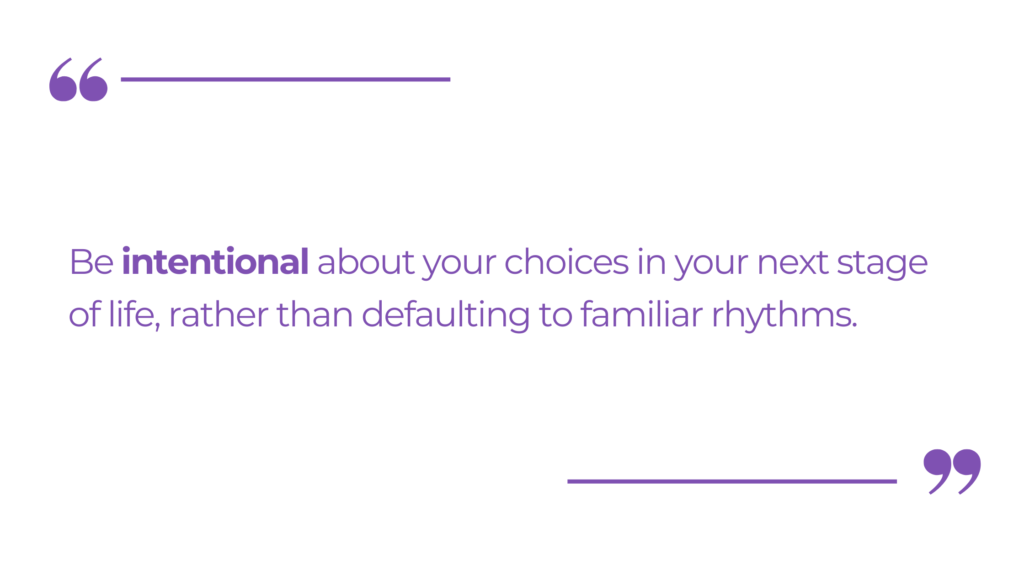
Think about what you value
As a new PhD, I absolutely didn’t know I needed to think about this; and I definitely didn’t know where to start.
I’ll explain why identifying what you value is crucial advice for PhD graduates.
But first, let’s start with some context: this question about what I valued was a no-brainer to answer in grad school. What I valued was academic excellence and intellectual freedom. The hours of research, thesis writing, presentations, getting published, etc., all were for the purpose of getting my PhD —and it was worth it.
However, I didn’t expect to feel lost after getting the PhD.
Getting the PhD is what consumed me for almost a decade of my life… so what happens after that chapter has closed? That’s something I hadn’t given much thought to because I was so focused on reaching that academic milestone.
Here’s my advice to PhD graduates:
Now that you’re starting a new chapter of life, use this opportunity to reflect on your core values. It’ll point you towards what actually brings you meaning in your work and life moving forward.
I know – it feels abstract and may not be obvious right away.
Start by asking yourself: what matters most to you now that your PhD is completed? What are your long-term goals and ambitions? What has changed, and what remains the same?

Another question that I’ve learned to ask myself is “What bothers me?” and to consider why. It’s a practice of being aware of what resonates with you and what doesn’t, and pivoting to align with the things you care about.
Aligning your career choices and life decisions with your values is essential for finding fulfillment and satisfaction. Consider what brings you meaning and purpose beyond your academic achievements, and let those values guide your path forward.
Over the years, I’ve also learned that our values can also evolve over time. Take a moment to reflect on what matters to you now as a starting point, and know that it’s something you may need to come back to and reassess over time.
Don’t freak out if you feel like you’re starting over
This, by far, is THE one piece of PhD advice I wish someone had told me so that I could have been better mentally prepared.
I’ll speak directly from my experience of starting a new job in industry after my PhD to explain what I mean.
After graduating, I started a new job in a biotech company that aligned well with my graduate studies. Naturally, I was excited. I had a shiny new degree that showcased my capabilities. I expected to hit the ground running and make waves at my new job.
Instead, reality hit me hard.
It wasn’t that I lacked capability (and by the way, neither do you!). But the fact is, starting a new job involves learning a lot of new things. I felt overwhelmed by the sheer volume I didn’t know on the job.
It wasn’t just about being an expert in my niche field anymore. Despite having relevant experience, I found myself grappling with unfamiliar tasks and responsibilities.
When I couldn’t meet my own unsaid expectations to excel, my confidence tanked and I wondered, “Maybe I’m not smart enough. Maybe I’m not the expert I thought I was…”
In hindsight, I realize the advice I needed was to give myself time to adjust. My optimism about what I could achieve was valid, but I underestimated the significant adjustments required in my new job.
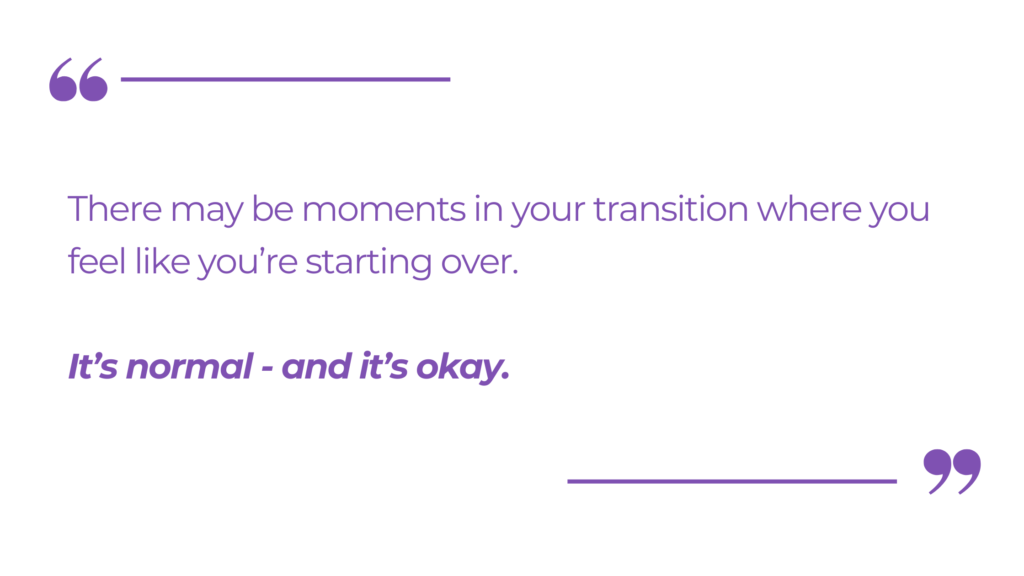
Of course, starting new jobs isn’t unique to PhDs. But, this academia-to-industry transition IS uniquely difficult post-PhD. Here’s why:
- You’re leaving a comfort zone you’ve inhabited for half a decade. The rhythms you’ve become so familiar with in grad school are changing.
- You might have relocated for your job, which means you’re leaving familiar communities and having to adjust to new surroundings.
- At the end of your PhD studies, you were the expert in your lab. Now, you’re the newcomer finding your footing in a different environment.
- Navigating industry is very different from academia, and something you have no experience doing (more on this in the next section).
I want to emphasize: There’s nothing wrong with these changes or your experience of them —they’re just different.
My pitfall was that I didn’t know to pause and acknowledge these differences and expected that I’d carry on as if nothing had changed.
Consider this piece of post PhD advice your heads-up, so you won’t be blindsided like I was. As you start this next chapter, know that there may be moments where you feel like you’re starting over. It’s normal – and it’s okay.
If you don’t hit the ground running, it’s not a reflection of your abilities. Transitioning from academia to post-PhD life often feels like a fresh start in many respects. Don’t panic, and give yourself time to adapt to this big change.
You need a different strategy to succeed in industry
If you’re reading this, you’ve probably already heard a lot about how entering industry after graduation is the way to go.
However, the PhD advice you haven’t heard is that you need different strategies to navigate and succeed in industry.
I experienced this firsthand. After celebrating my PhD, I was ready to take on the world of industry. But over time, I realized that navigating industry was a VERY different ballgame.
Practices that worked well in academia didn’t quite fit with industry. What’s worse: it was not obvious to me what I should do instead. I didn’t expect to feel so out of place.
Nearly every industry scientist I’ve talked to post-PhD has had a similar rude awakening.
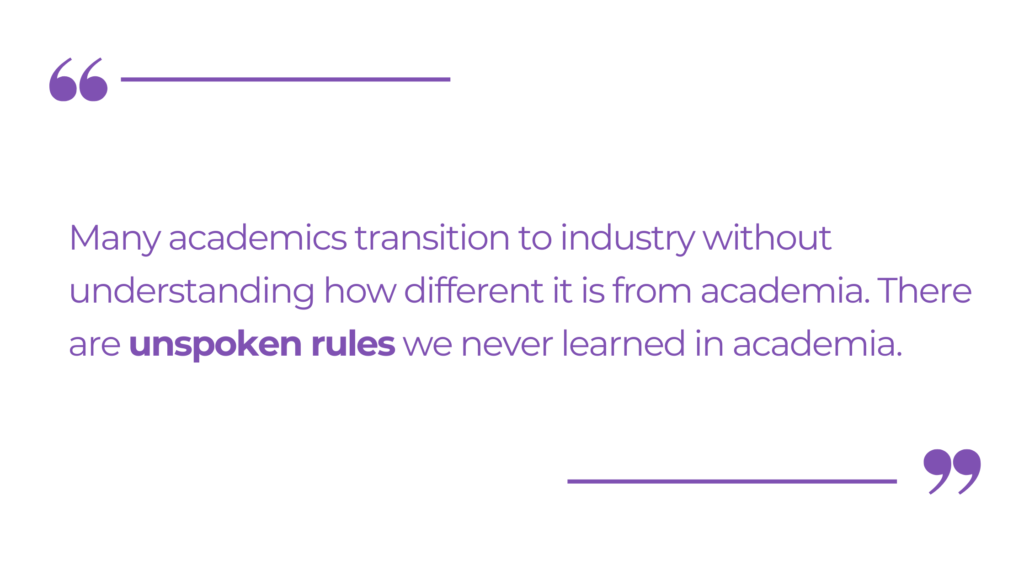
Academics often hear about the glamor of industry jobs. That’s not necessarily wrong; but what I’ve realized is that nobody talks about how tough the transition into industry can be sometimes. This lack of continued information ends up leaving PhD graduates blindsided.
While I’m all for optimism, I’m also a firm believer in being practical and informed. 🙂
It’s the reason why I founded Elevate PhD. Many academics transition to industry without understanding how different it is from academia. There are unspoken rules we never learned in academia. Unfortunately, you won’t know what you haven’t been taught.
My goal is to bridge this gap by sharing my insights and advice for PhDs who want careers in industry
I know I’m not the only one who struggled to find my footing in industry, and I want to ensure you know you’re not alone either. My aim is to equip you with the knowledge, tools, and support to navigate your industry career.
If you’re on the brink of your industry transition, check out my article on the differences between working in academia versus industry. It provides insights on what to expect so you’re not caught off guard.
I know firsthand how isolating it can be to fumble through the ins and outs of industry, wondering the whole time if you’re doing anything right. If you want personalized support, know that I’m here to help!

Sometimes you can’t rush things
My last piece of advice for PhDs is one that we, as high achievers, might not want to hear.
After I got my PhD, I did what I know best – which was to find my next goal to achieve. I wanted the next impressive achievement, and I wanted to get there fast. For me, that meant climbing the Scientist-track career ladder as quickly as I could.
I spent a lot of energy doing everything I thought would get me promoted—without knowing what I know now. I chased what I viewed as success without deeply considering my values. Work-life balance was an afterthought.
(Needless to say, this was a straight path to burnout… but that’s a story for another time.)
When my efforts seemed to get me nowhere, I wasted a lot of emotional energy being upset at the situation. All this hustle mentality did was leave me frustrated and tired.
Why do I mention this?
First, I think we need to break down 2 reasons why we may feel a need to rush:
1. We’ve tied our achievements to our identity or worth. Being able to quickly reach the next goal makes us feel impressive or validates our abilities.
2. We feel like we’re behind—whether because of comparison to others or trying to make up for the time we lost in school.
There’s nothing wrong with setting goals and pursuing them. But my advice for PhDs is to be honest with ourselves on the “why”.
Are we seeking validation of our worth? Are we comparing our progress to others? Are we pursuing societal definitions of success at the expense of our personal values?
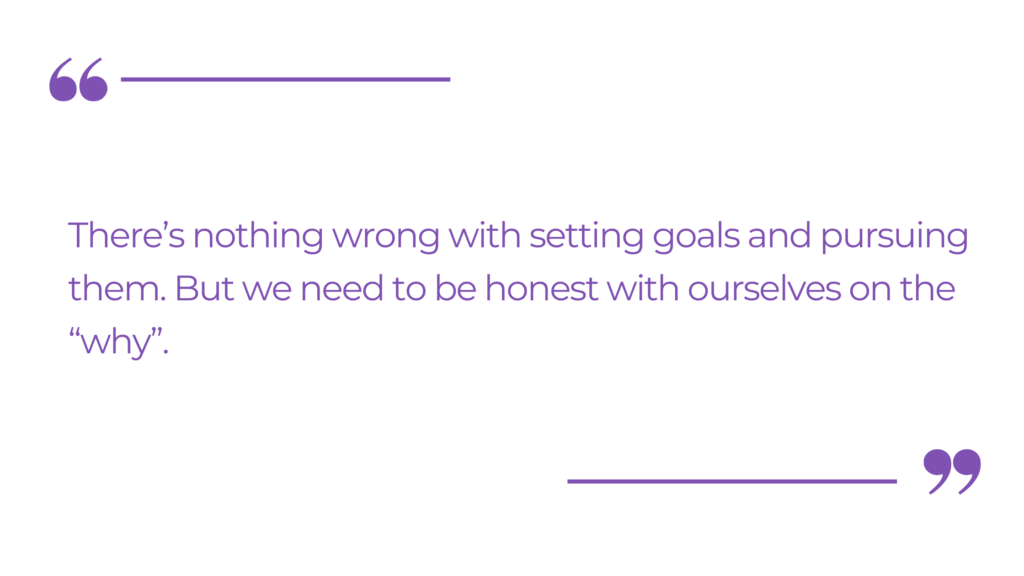
At the same time, I learned the hard way that some things are simply beyond my control. While I strive to excel in what I can influence, some obstacles cannot be overcome through sheer effort alone. Sometimes, it also meant accepting that it’s a matter of luck and timing.
So, what then?
While the situation and timeline might not be within your control, remember that this isn’t a permanent state.
Take each day patiently, one step at a time—even if progress feels slow or smaller than you would like. Adjust your strategy when you need to. You’ll still be making progress.
You’re not behind. You’re exactly where you need to be right now, and this phase won’t last forever. Timelines often have a way of straightening themselves out in the long run. 🙂
As you conclude your academic studies, I hope you take a moment to celebrate all that you’ve accomplished. You and I both know how much time and energy it took to reach this impressive milestone.
However, I also hope you walk into your post-PhD life with both excitement and encouragement. As it turns out, there’s a lot more to life than those three letters after your name.
I hope that you’ll find my PhD advice a helpful starting point as you kick-off the next part of your journey outside of academia. Take it from me – it’s okay to feel uncertain or to take time to find your footing during this transition period.
Your career and journey is unique, and there’s no one-size-fits-all approach. What matters most is that you stay true to yourself, prioritize your well-being, and continue to evolve in ways that resonate with you.
The best is yet to come. Cheers to you and your next adventure! 🙂
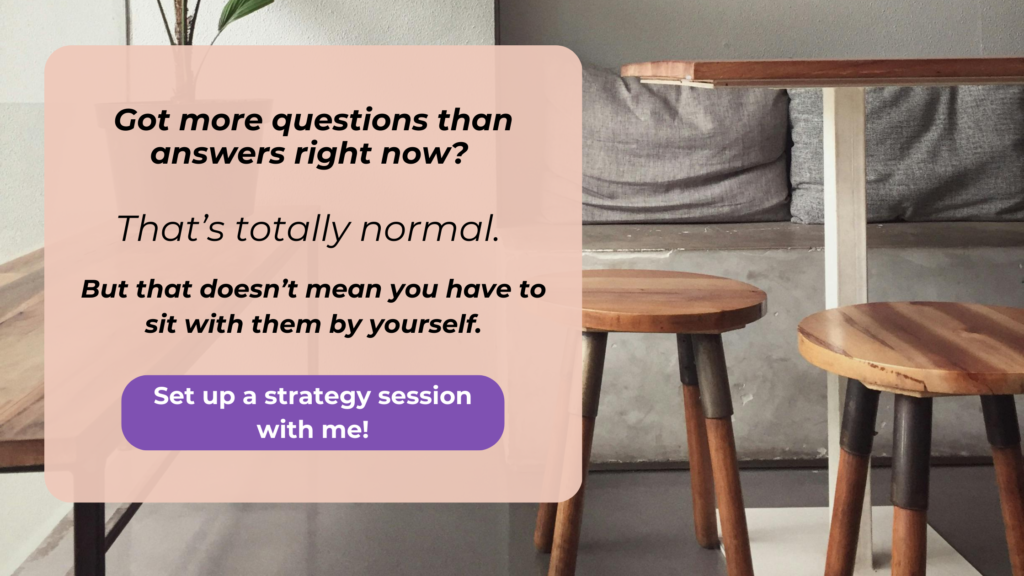




Add A Comment